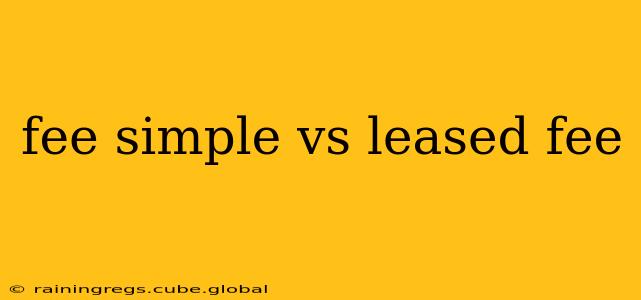Understanding the nuances of real estate ownership is crucial for both investors and property owners. Two fundamental concepts often cause confusion: fee simple and leased fee. This article will dissect these ownership structures, highlighting their key differences and implications. We'll also address some frequently asked questions to provide a comprehensive understanding.
What is Fee Simple Ownership?
Fee simple, often referred to as freehold ownership, represents the highest form of ownership in real estate. It grants the owner complete control and rights to the property, including the land and any improvements (buildings, structures, etc.). This ownership is essentially absolute and unrestricted, lasting indefinitely unless it's specifically transferred or encumbered. The owner has the right to possess, use, enjoy, sell, lease, or will the property as they see fit. Think of it as owning the property outright.
Key Characteristics of Fee Simple Ownership:
- Indefinite Duration: The ownership lasts forever, passing down through generations unless sold or otherwise transferred.
- Full Control: The owner has complete control over the property and its usage, subject to zoning laws and other regulations.
- Inheritance: The property can be passed down through a will or intestacy laws.
- Marketability: It's easily bought, sold, and financed.
What is Leased Fee Ownership?
Leased fee ownership refers to the ownership interest of the landlord in a property that's subject to a lease agreement. In essence, the landlord retains ownership of the land and the building, but the right to use and occupy the property is temporarily transferred to a tenant under a lease. The landlord receives rent payments in exchange for granting this right of occupancy. The leasehold interest is a separate, distinct ownership interest from the leased fee.
Key Characteristics of Leased Fee Ownership:
- Limited Rights: The owner (landlord) retains ownership but relinquishes the right to occupy the property for the lease term.
- Rental Income: The primary benefit is the receipt of rental income from the tenant.
- Lease Restrictions: The landlord's rights are subject to the terms and conditions of the lease agreement.
- Reversionary Interest: Upon the lease expiration, the full rights to the property revert back to the landlord.
Fee Simple vs. Leased Fee: A Side-by-Side Comparison
| Feature | Fee Simple | Leased Fee |
|---|---|---|
| Ownership Type | Absolute, unrestricted ownership | Ownership subject to a lease agreement |
| Rights | Full rights to possess, use, and enjoy | Ownership rights, but occupancy rights leased |
| Duration | Indefinite | Limited to the lease term |
| Income | No guaranteed income from the property | Rental income |
| Responsibility | Full responsibility for property upkeep | Responsibility depends on the lease terms |
| Marketability | High | Can be sold, but value is impacted by lease |
What are the advantages and disadvantages of each?
Fee Simple Advantages:
- Complete Control: Unfettered ability to use and modify the property.
- Potential for Appreciation: Opportunity for capital gains through property value increases.
- Long-Term Investment: A stable, lasting investment.
Fee Simple Disadvantages:
- High Upfront Cost: Requires significant capital investment.
- Responsibility for Upkeep: All maintenance and repair costs are the owner's responsibility.
- No Guaranteed Income: No immediate rental income stream.
Leased Fee Advantages:
- Rental Income: A consistent stream of income.
- Lower Upfront Cost: Requires less initial capital compared to fee simple.
- Potential for Appreciation: Property value can still appreciate, adding to the value of the leased fee.
Leased Fee Disadvantages:
- Limited Control: The landlord's ability to use the property is restricted during the lease term.
- Lease Risk: The lease may not renew, leaving the landlord without income.
- Tenant Responsibilities: Landlord responsibilities are dictated by the lease.
What are the tax implications of Fee Simple and Leased Fee?
Tax implications vary significantly based on location and specific circumstances. For fee simple ownership, property taxes are a significant cost. For leased fee ownership, the landlord pays property taxes on the assessed value of the property; the tenant may be responsible for certain taxes depending on the lease terms. Consult with a tax professional for detailed advice on your specific situation.
How do I choose between Fee Simple and Leased Fee?
The best choice depends entirely on your financial goals, risk tolerance, and investment strategy. If you're looking for long-term ownership and control, fee simple is a good option. If you prioritize consistent income and lower upfront costs, leased fee may be more suitable. Consult with a real estate professional to determine the best path for your specific situation.
This article provides a general overview. Consulting with real estate and legal professionals is crucial before making any significant decisions regarding property ownership.
